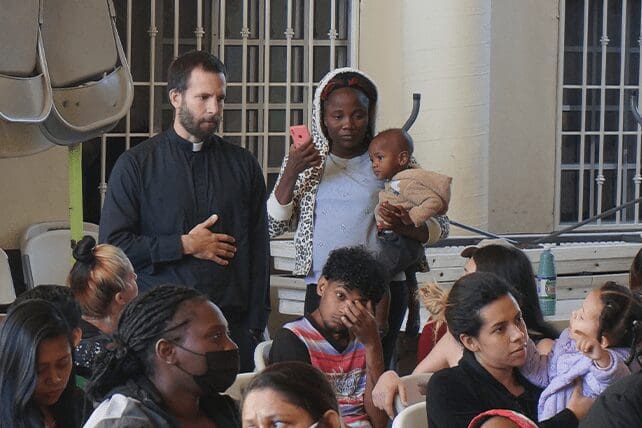REYNOSA, Mexico (AP) — Two long lines of migrants waited for blessings from visiting Catholic priests celebrating Mass at the Casa del Migrante shelter in this border city, just across the bank of the Rio Grande River from Texas.
After services ended last week, several crammed around the three Jesuits again, asking about upcoming U.S. policy changes that would end pandemic-era asylum restrictions. That’s expected to result in even more people trying to cross the U.S.-Mexico border, adding to the already unusually high apprehension numbers.
“All of you will be able to cross at some point,” the Rev. Brian Strassburger told the nearly 100 Mass goers in Spanish while a Haitian migrant translated in Creole. “Our hope is that with this change, it will mean less time. My advice is, be patient.”
It is getting harder to deliver that message of hope and patience not only for Strassburger, but also for the Catholic nuns running this shelter and leaders from numerous faith organizations who have long shouldered most of the care for tens of thousands of migrants on both sides of the border.
Migrants here — mostly from Haiti, but also Central and South America and more recently from Russia — are deeply mistrustful of swirling policy rumors. A judge has ordered the restriction known as Title 42, which only affect certain nationalities, to end Wednesday. But the asylum restriction, which was supposed to lift in May, is still being litigated.
Faith leaders working on the border are wary of what’s to come. They expect tensions will keep rising if new restrictions are imposed. And if not, they will struggle to host ever larger numbers of arrivals at already over-capacity shelters and quickly resettle them in a volatile political environment.
“People are coming because it’s not long before the bridge will be opened. But I don’t think that the United States is going to say, ‘OK, all!’” said the Rev. Hector Silva. The evangelical pastor has 4,200 migrants packed in his two Reynosa shelters, and more thronging their gates.
Pregnant women, a staggering number in shelters, have the best chance of legally entering the U.S. to apply for asylum. It takes up to three weeks, under humanitarian parole. Families wait up to eight weeks and it can take single adults three months, Strassburger explained at Casa del Migrante, where he travels from his Texas parish to celebrate Mass twice a week.
Last week, the shelter housed nearly 300 people, mostly women and children, in tightly packed bunk beds with sleeping pads between them. Men wait in the streets, exposed to cartel violence, said Sister Maria Tello, who runs Casa del Migrante.
“Our challenge is to be able to serve all those who keep coming, that they may find a place worthy of them. …Twenty leave and 30 enter. And there are many outside we can’t assist,” said Tello, a Sisters of Mercy nun.
Edimar Valera, 23, fled Venezuela with family, including her two-year-old daughter. They crossed the notoriously dangerous Darien Gap, where Valera nearly drowned and went without food. After arriving in Reynosa and escaping a kidnapping, she found refuge at Casa del Migrante, where she’s been since November despite having a sponsor ten miles away in McAllen, Texas.
“We need to wait, and it could be good for some and bad for others. One doesn’t know what to do,” she said, finding some comfort in Mass and daily prayers, where she begs God for help and patience.

